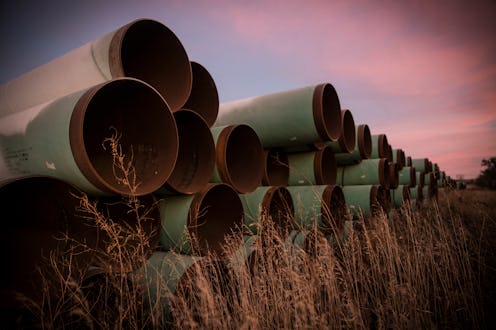News
South Dakota Warns It Might Revoke The Keystone Pipeline Permit After The Oil Spill

Regulators in South Dakota have warned they could revoke TransCanada's permit for the controversial Keystone pipeline should an investigation into last week's spill find the company violated the terms of its license. Yet even if regulators decided to revoke TransCanada's permit, the pipeline isn't likely to be shut down indefinitely, Reuters has reported. Rather, the pipeline would be temporarily closed to oil shipments until the company could address and rectify any and all violations.
"If [the pipeline] was knowingly operating in a fashion not allowed under the permit or if construction was done in a fashion that was not acceptable, that should cause the closure of the pipe for at least a period of time until those challenges are rectified," Gary Hanson, a member of the three-person South Dakota Public Utilities Commission, told Reuters.
Federal and state regulators have launched an investigations into the cause of last week's spill as part of a broader effort to determine if TransCanada violated any of the reported 57 conditions attached to its construction and operation permit. That permit was approved by the South Dakota Public Utilities Commission way back in 20018. While an initial report is reportedly expected to be completed within the next few weeks, the commission has said it could be months before they know whether or not any violations occurred, local news channel KSFY has reported.
A spokesman for the Pipeline and Hazardous Materials Safety Administration told Reuters earlier this week that regulatory officials planned to remain at the scene of the spill until the pipeline had been restarted. Regulatory officials are reportedly monitoring efforts to excavate and pack the damaged portions of the pipeline for further testing and analysis. As of Thursday, TransCanada had yet to set a return-to-service date and it remains unclear how long clean up and restoration efforts might take.
But the threat of a revoked permit isn't the only potential obstacle the company behind the controversial pipeline is facing. According to the Wall Street Journal, a boom in hydraulic fracturing has caused both the demand and price of the bitumen TransCanada seeks to bring in from Alberta to sink as cheap natural gas pours into the energy market. While oil was priced at more than $130 a barrel in 2008, when TransCanada first sought its permit, it has since dropped, reaching a near two-year high of $58.
However, in a statement released in early November, the company noted that although it anticipated "commercial support for the project to be substantially similar to that which existed when we first applied for a Keystone XL pipeline permit," they also anticipated a need for "new shippers" due to "reductions in volume commitments by other shippers."
The Keystone pipeline is part of a controversial line stretching more than 2,500 mile which transports crude oil from the Athabasca tar sands in Alberta, Canada to multiple locations across the United States including Illinois and Oklahoma. Last week's spill was the third pipeline leak to have occurred in South Dakota within the last year, according to a spill database run by the South Dakota Department of Environment and Natural Resources.
Earlier this week a member of the South Dakota Public Utilities Commission expressed concerns over the apparent frequency of the leaks. "We've had three fairly major leaks just on the border with North Dakota and two in South Dakota in a very short period of time," Vice Chairman of the South Dakota Public Utilities Commission Gary Hanson told Aberdeen News. "One might expect this to take place on a pipeline over a period of 30 or 40 years at the maximum, yet it's been fewer than 10 years."
While Hanson, who served on the commission in 2008 when TransCanada's permit for construction was approved, acknowledged the commission had known a leak was bound to happen, he said the multiple leaks were "very disturbing."
"This is a relatively new pipeline," Aberdeen News reported Hanson said. "It is supposed to have an operating life of more than 100 years and it was supposed to be a state-of-the-art pipeline construction. It appears that it is not."
According to TransCanada, there are roughly 170 people working on clean up and remediation activities at the site of the spill. According to the company, some 24,450 gallons of the roughly 210,000 gallons of oil reported to have spilled had been recovered as of Wednesday.